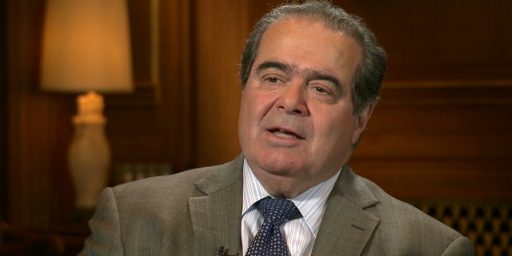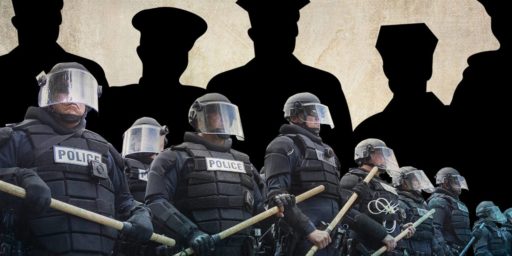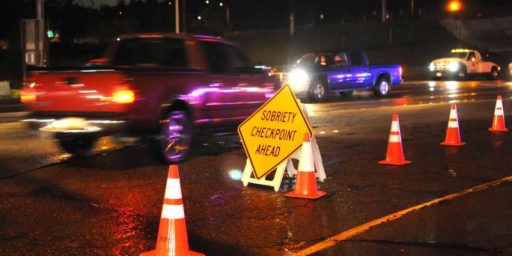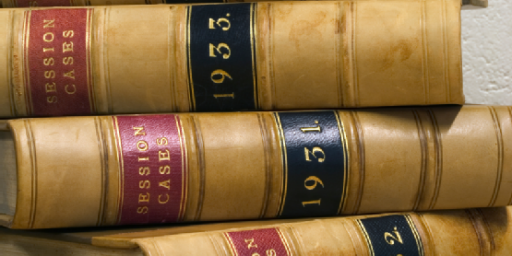Knock and Announce Not Subject to Exclusionary Rule
The Supreme Court yesterday ruled that evidence gathered through illegal “no knock” searches did not necessarily need to be excluded from trial if the search was otherwise legal.
NYT’s Linda Greenhouse:
Evidence found by police officers who enter a home to execute a search warrant without first following the requirement to “knock and announce” can be used at trial despite that constitutional violation, the Supreme Court ruled on Thursday. The 5-to-4 decision left uncertain the value of the “knock-and-announce” rule, which dates to 13th-century England as protection against illegal entry by the police into private homes.
Justice Antonin Scalia, in the majority opinion, said that people subject to an improper police entry remained free to go to court and bring a civil rights suit against the police. But Justice Stephen G. Breyer, writing for the dissenters, said the ruling “weakens, perhaps destroys, much of the practical value of the Constitution’s knock-and-announce protection.” He said the majority’s reasoning boiled down to: “The requirement is fine, indeed, a serious matter, just don’t enforce it.”
WaPo’s Charles Lane:
The Constitution does not require the government to forfeit evidence gathered through illegal “no knock” searches, the Supreme Court ruled yesterday, in a far-reaching ruling that could encourage police with search warrants to conduct more aggressive raids.
The 5 to 4 decision broke with the court’s modern tradition of enforcing constitutional limitations on police investigations by keeping improperly obtained evidence out of court. The “exclusionary rule” has been imposed to protect a series of rights, such as the right to remain silent in police custody and the right against warrantless searches. But the broadly worded majority opinion by Justice Antonin Scalia, joined by Chief Justice John G. Roberts Jr. and Justices Anthony M. Kennedy, Clarence Thomas and Samuel A. Alito Jr., suggested that the nation has moved into a new era of improved policing in which such strong medicine may no longer be justified.
[…]
At issue in yesterday’s case, Hudson v. Michigan , No. 04-1360, was the “knock and announce” rule, which has deep roots in Anglo American law. In 1995, the court made it part of what defines a “reasonable search” under the Fourth Amendment, without saying how it should be enforced.
[…]
Before yesterday’s decision, police executing a search warrant in most jurisdictions had to worry that they might lose a case if they did not first knock on the door, announce themselves and wait a reasonable time for a response before forcing their way in. Now, unless state law says otherwise, the most they would face is administrative discipline or a lawsuit for damages. Civil liberties groups and defense lawyers had argued to the court that those deterrents are far too weak to enforce the “knock and announce” rule, which, they argued, is often all that stands between an innocent citizen and an errant SWAT team.
Lyle Denniston has a superb discussions of the implications of the case on the exclusionary rule more broadly.
The bare holding of the case is simple: if police have a warrant to search a home, and they enter in a way that violates their constitutional duty to knock first and announce themselves, the evidence turned up in the search can be used in a criminal prosecution.
[…]
First, the Court made clear — with an emphasis not previously employed — that it will insist on a demonstration that the interest that a constitutional right serves will, in fact, be directly advanced by barring the evidence obtained from a violation of that right. Thus, it would not matter that the violation itself was the source of the evidence, if the right would not gain from excluding the evidence. As Justice Scalia summed up that point: “What the knock-and-announce rule has never protected…is one’s interest in preventing the government from seeing or taking evidence described in a warrant. Since the interests that were violated in this case have nothing to do with the seizure of the evidence, the exclusionary rule is inapplicable.” Thus, at least in the context of the knock-and-announce rule, a Fourth Amendment violation that makes a search invalid will not keep out the resulting evidence.
Kieran Healy argues that Scalia is “happy to set his originalism aside” when it suits his public policy preferences. Kevin Drum, who sees this ruling as “viscerat[ing] the Bill of Rights a bit further,” agrees, saying this demonstrates “why I decline to take originalism seriously.” Orin Kerr is less sure but at least amused by the concept. “Am I right that Scalia is saying that the meaning of the Fourth Amendment can change over time as the staffing of police departments and public interest law offices changes? The Constitution — It’s alive!”
I would note, however, that the Exclusionary Rule is a judicial invention (Weeks v. US) that was applied on a large scale (i.e., applicable to states and municipalities) only relatively recently with Mapp v. Ohio (1968). It is noteworthy, too, that while Greehouse points out that the “knock and announce” requirement goes back to the earliest conceptions of citizen rights under the Common Law, the society which gave us the Common Law, England, does not have an exclusionary rule and, indeed, their judges consider punishing society for the actions of over-eager cops absurd.
Radley Balko quite eloquently describes the reasons we don’t want cops, even those with warrants, kicking down doors:
the terror and fright associated with having once door beaten down in the middle of the night by armed, masked men; the unimaginable predicament a homeowner is unwillingly put in when he must decide if the intruders are cops or criminals, and whether to confront them or succumb to them; the injury and death that often transpires (to police, suspects, and bystanders) as a result; the right to assume one’s home is his castle and place of asylum, and the idea that one should have the opportunity to answer police and avoid the fright and property destruction resulting from a forced entry; and the fact that the perilousness of the situation can lead to police themselves mistaking harmless gestures on the part of suspects as threatening or menacing, again resulting in unnecessary death and injury.
Ron Coleman believes that excluding evidence so obtained is the only realistic way to protect that right. Dean Esmay, answering in the comments, suggests some sort of points system for cops. Scalia suggests civil penalties. Ultimately, I’m unsure how well any of these penalties work.
Indeed, the cop in this case had every reason to believe the Exclusionary Rule would apply and violated the law anyway. Thus, whatever of the violations Balko describes that the accused experienced occured. The question, then, is what to do about it? Should a criminal be allowed to go free even though there was nothing unreasonable about searching his home per se, including the fact that a warrant had been properly issued, simply because the cop kicked down the door? It’s far from clear to me that makes any sense.
UPDATE: To be clear, it seems to me that our public policy interest in preventing “no knock” searches is in the fact that the cops are often at the wrong house or otherwise incorrect in their presumption that they are dealing with violent criminals and, to a lesser degree, lessening the chance that frightened criminals or nervous cops will instinctively start a shootout that might otherwise have been avoided. There may or may not be better ways to enforce that than the Exclusionary Rule.
There is zero public policy interest, however, in releasing criminals because the lack of knocking did not give them sufficient lead time to destroy the evidence for which a valid warrant was issued.
UPDATE: For a dissenting view, see Steve Verdon’s post Cato’s Mark Moller on Hudson v. Michigan.






As I understand it, the Exclusionary Rule is just about the only mechanism for enforcing any constraints on police searchs. Prosecutors are generally unwilling to prosecute the police. Lawsuits are mostly for those with the money to hire lawyers.
If the cops are entering your home illegally, aren’t they also criminals? Why should they be able to get away with it if the rest of us can’t?
It’s not a question of whether a criminal will get away with a crime, it’s a question of which criminals are allowed to get away with their crimes. Given that most of these cases involve drug crimes, I’m thinking that cops who act illegally pose more of a danger to the public and that it’s more important to hold them obedient to the law.
Avedon:
Sure. But that doesn’t necessarily mean we should let guilty drug dealers go. The evidence is being seized pursuant to a legal warrant. The “crime” is kicking the door in to enforce the warrant rather than knocking and waiting a reasonable time for the dealers to answer it and let the cops in. Presumably, they might destroy the evidence in the nonce but, since that too is illegal, I’m not sure they have any claim there.
frightened criminals or nervous cops
Or innocent, pistol-packing civilians, who hear the door break in, grab their guns, & shoot whoever first enters their bedroom.
If the Court’s decision were a statute, I’d call it the Civilian-&-Cop-Killing Act of 2006.
Who would you most want to protect with the “knock and announce” rule? The innocent where they would want to help the police recognize that they are at a mistaken address.
Imagine two scenarios in a duplex. In one, we have a man who has kidnapped a young girl, gagged her, literally nailed her to the floor and is repeatedly raping her. In the other, we have a guy who is working a couple of jobs, including a night shift, and is sleeping. The police, suspecting the horrors the girl is going through, cut corners in executing a valid search warrant (as this case had a valid search warrant). Now lets assume that they announce themselves, but failed to knock (as in this case). They burst into the correct side of the duplex, free the girl and arrest the rapist. Now the question is (and was before the court) what should the penalty be. They are searching with a valid search warrant, but they failed to knock. The left side of the court says the correct procedure would be to exclude the evidence from the search including evidence that stems from what is found there. So the evidence of the torture, rape, etc would all be excluded.
Now imagine that the error also included getting the wrong side of the duplex. The burst in, grab the guy just waking up, tear the place apart trying to find where he has hidden the girl. The discover they are at the wrong address, the rapist killed the girl and has left. Now how does the exclusionary rule help the innocent man who was handcuffed, kept on the floor with a knee in his back and had his place taken apart.
The exclusionary rule is premised that two wrongs can make a right. The first wrong is the polices when they fail to conduct themselves according to some standard (which may not have been something they could be trained to avoid, for example the lack of reading rights to the accused that gave us the Miranda warning). The second wrong is that suppression of truth will best serve the public interest. This rule is nearing its 100th birthday, but is a far cry from being original with the constitution. Fines, loss of job (temporary or permanently), jail time, etc are all potential ways to curb the police from illegal searches, without necessarily suppressing truth. Only the rich would be able to sue? Well only the guilty get a benefit now. Make it a criminal case. Disbar district attorneys who show themselves to be to reluctant to pursue criminality among the police. There are lots of ways to address this without suppressing the truth. And many of them also provide the potential for more directly helping the innocent.
All the court did was look at a supreme court decision and say that a different penalty than suppressing the truth may be appropriate in cases like this one.
Commenting at the Volokh Conspiracy, Medis has a really good point: overreliance on the Exclusionary Rule goes hand-in-hand with our societal reluctance to curb police misconduct.
It’s a long comment; check it out if you’re interested in thinking about Hudson and the Rule.
England, does not have an exclusionary rule and, indeed, their judges consider punishing society for the actions of over-eager cops absurd.
I have to agree with the comments to the effect that the Exclusionary Rule is a pretty poor sanction for illegal searches. It is even harder to make a case for it being the principal sanction for illegal searches. After all, as has been pointed out elsewhere, it punishes the cops only in those cases where criminal conduct was actually taking place. If the cops kick down the door of a family who are as pure as the driven snow, there’s no evidence of wrongdoing to exclude, because there is no wrongdoing. The sanction is empty.
That’s not the kind of incentive structure which it would have occurred to me was good to confront the police with. But then, I’m no Supreme Court justice. (Steve is doubtless sighing with relief at that last, and I don’t really blame him.)